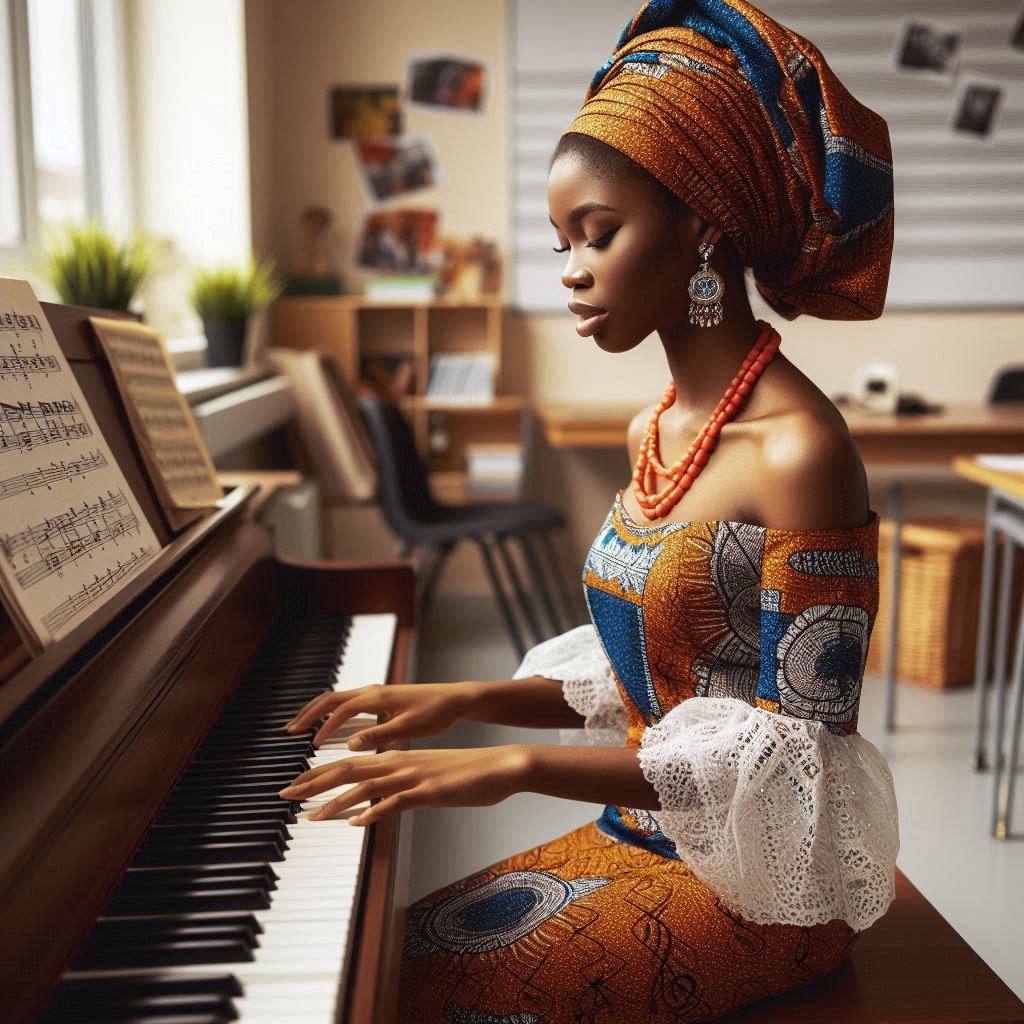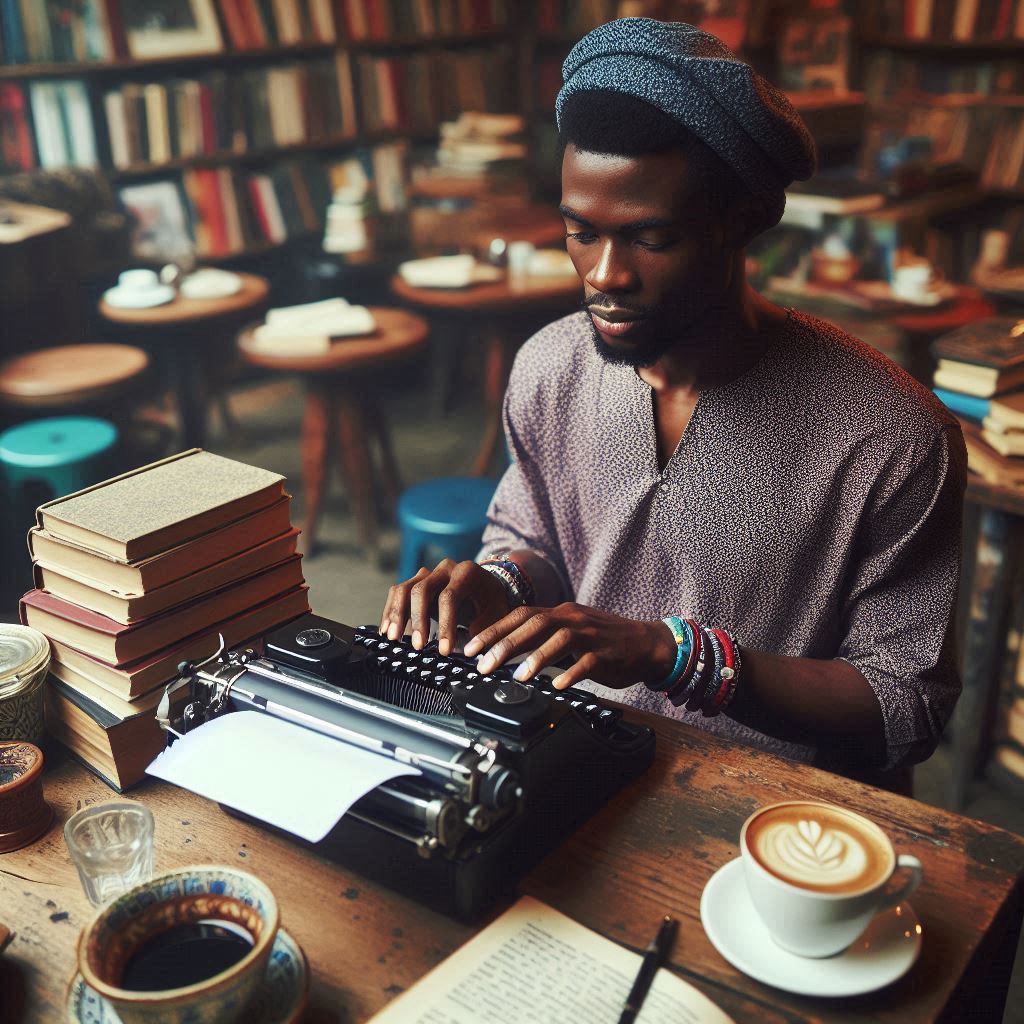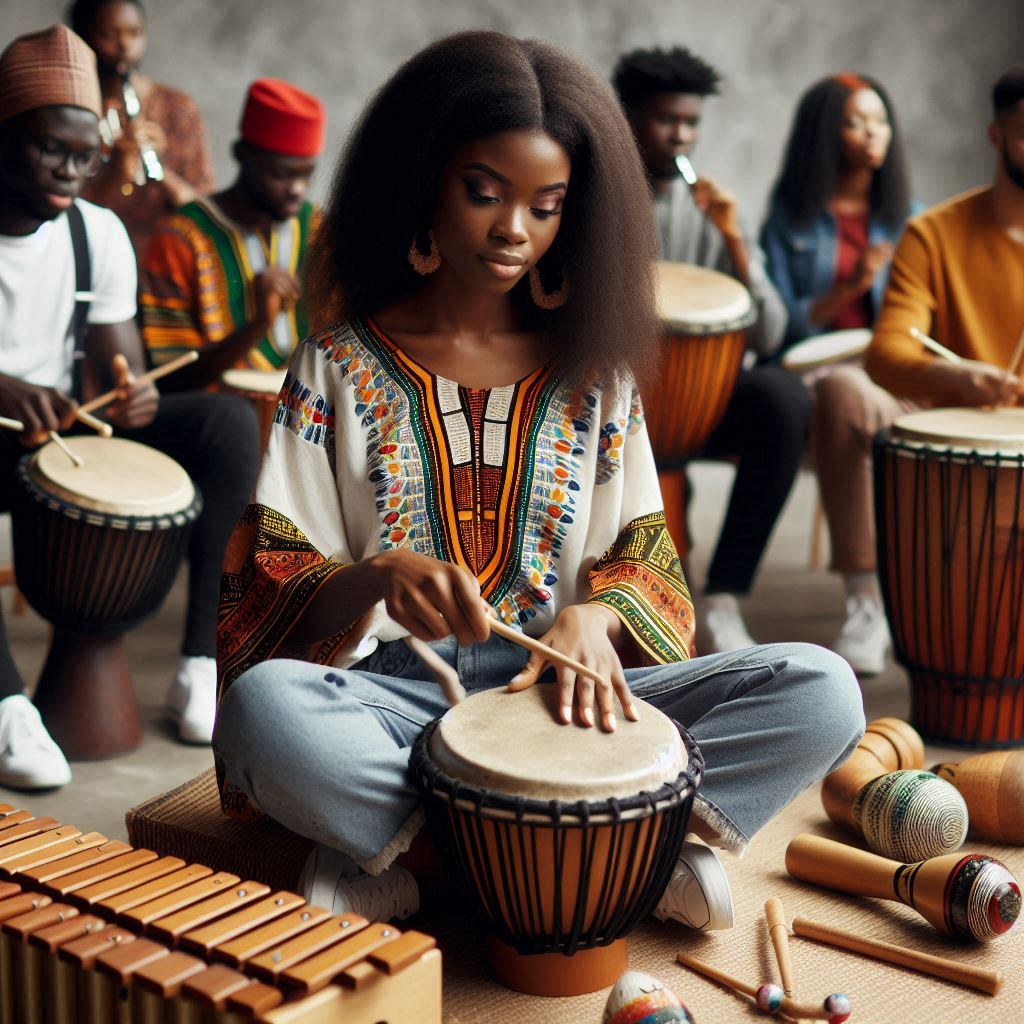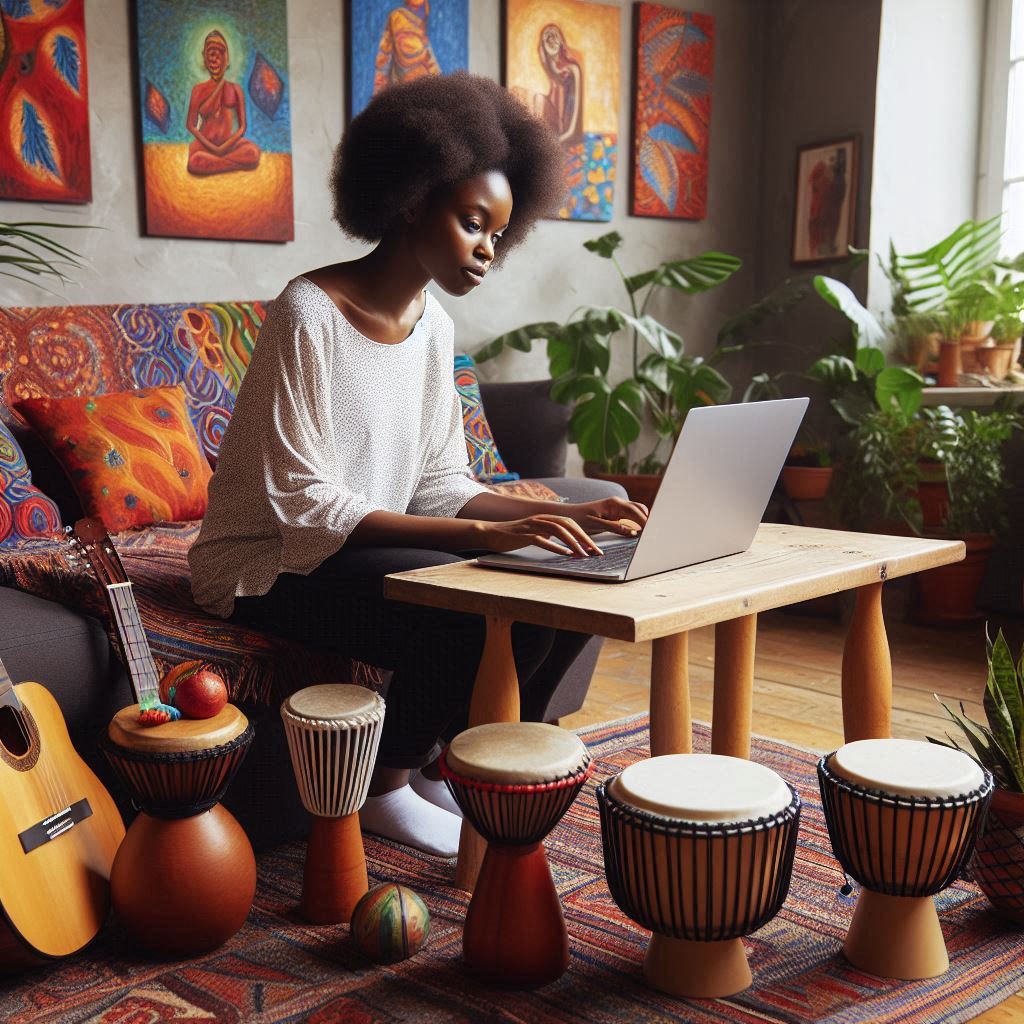Introduction
Nigerian music is rich, diverse, and deeply rooted in tradition.
The country’s musical heritage boasts an array of unique instruments. These instruments are not just tools for creating music but are also integral to Nigeria’s cultural identity and history.
Brief Overview of Nigerian Musical Instruments
Nigeria’s musical instruments vary across its numerous ethnic groups. Each instrument holds a significant place in the communities that play them.
The Yoruba, Igbo, and Hausa are just a few of the many ethnic groups in Nigeria, each with its own distinct musical traditions.
Drums
Drums are central to Nigerian music. The talking drum, known as “Gangan” in Yoruba, is one of the most famous. It can mimic the tones and inflections of human speech.
This allows drummers to communicate messages through their playing. The Bata drum, another Yoruba instrument, is used in religious ceremonies and celebrations.
In the north, the Hausa play the “Kalangu,” a type of talking drum, during festive occasions.
String Instruments
String instruments also feature prominently in Nigerian music. The “Kora,” a 21-string lute-bridge-harp, is popular among the Hausa and Fulani.
The Igbo have the “Ubo aka,” a thumb piano that produces melodic tunes. These instruments are used for storytelling, entertainment, and spiritual ceremonies.
Wind Instruments
Wind instruments add a unique flavor to Nigerian music. The “Oja,” an Igbo flute, is used in various ceremonies and dances.
The “Algaita,” a double-reed wind instrument, is played by the Hausa during traditional festivities. These instruments often accompany other musical forms to create a rich, harmonious sound.
Percussion Instruments
Percussion instruments are indispensable in Nigerian music. The “Shekere,” a beaded gourd, is common across many ethnic groups. It produces a rhythmic sound when shaken.
The Yoruba use the “Agogo,” a bell, to keep time in music and dance. These instruments provide the rhythmic backbone for many Nigerian musical compositions.
Importance of Musical Instruments in Nigerian Culture
Musical instruments are more than just tools for making music in Nigeria. They are deeply embedded in the social and cultural fabric of the country.
Social and Cultural Significance
In many Nigerian communities, musical instruments are essential in rituals and ceremonies.
They are played during weddings, funerals, and festivals. Drums, for instance, are used to communicate with ancestral spirits and deities.
They are believed to bridge the gap between the physical and spiritual worlds.
Storytelling and Oral Tradition
Nigerian musical instruments are vital for storytelling. Musicians use instruments to narrate historical events and folklore. This oral tradition ensures that cultural heritage is passed down through generations.
String and wind instruments often accompany these stories, adding depth and emotion to the narratives.
Entertainment and Celebration
Music is a key component of entertainment and celebration in Nigeria. Instruments like the Shekere and Bata drum are played during dances and social gatherings.
These instruments create a lively and festive atmosphere, bringing people together in joy and celebration.
Identity and Heritage
Musical instruments are symbols of identity for many Nigerian ethnic groups. They reflect the history, values, and beliefs of the communities that play them.
Preserving these instruments and their music is crucial for maintaining Nigeria’s rich cultural heritage.
In fact, Nigerian musical instruments are a vital part of the country’s culture. They serve as tools for communication, storytelling, and celebration, reflecting the rich diversity and history of Nigeria.
Traditional Nigerian Musical Instruments
When it comes to traditional Nigerian musical instruments, there is a rich history and cultural significance attached to each instrument.
From the iconic talking drum to the melodic shekere, these instruments play a vital role in Nigerian music and cultural heritage.
Talking Drum
The talking drum, also known as “dundun,” is a traditional Nigerian instrument that has been used for centuries.
Its unique shape and construction allow the player to mimic the tones and rhythms of human speech, hence the name “talking drum.”
The talking drum holds great cultural significance in Nigerian society, as it is often used to communicate messages, announce important events, and accompany traditional ceremonies.
It is a symbol of cultural identity and pride for many Nigerians.
Traditional Nigerian music genres such as Juju, Afrobeat, and Highlife prominently feature the talking drum.
Its rhythmic patterns and melodies add a dynamic element to the music, creating a lively and vibrant atmosphere during performances.
Shekere
The shekere is a percussion instrument made from a dried gourd covered with a net of beads, shells, or seeds. It is played by shaking the instrument to produce rhythmic patterns and sounds.
In Nigerian culture, the shekere is often associated with celebrations, festivals, and rituals. It is believed to have spiritual significance and is used to create a connection between the physical and spiritual worlds during ceremonies.
Traditional Nigerian music genres like Afrobeat, Fuji, and Apala make frequent use of the shekere.
Its bright and resonant sounds add texture and depth to the music, creating a festive and joyful atmosphere.
Udus
The udus is a clay pot drum that originated from the Igbo people of Nigeria. It is traditionally played by striking or tapping the openings on the side of the pot to produce deep, resonant tones.
The udus holds cultural significance in Nigerian society, particularly among the Igbo people, where it is used in traditional ceremonies, rituals, and festivals. It is a symbol of heritage and belonging for many Nigerians.
Traditional Nigerian music genres like Igbo Highlife, Ogede, and Bolo feature the udus prominently.
Its earthy and percussive sounds create a rhythmic foundation for the music, adding a sense of depth and authenticity to the performance.
Agogo
The agogo is a bell-like instrument made of metal or wood, with two or more bells that are interconnected and produce different pitches when struck. It is commonly used in Nigerian music and dance performances.
Nigerian culture links the agogo to traditional ceremonies, festivals, and celebrations, believing it brings luck and unity.
Traditional Nigerian music genres like Yoruba Juju, Apala, and Sakara feature the agogo prominently.
Its bright and metallic sound adds a melodic element to the music, enhancing the overall rhythm and energy of the performance.
Read: Challenges in Teaching Christian Religious Studies
Influence of Colonialism on Nigerian Music
Colonialism significantly shaped Nigerian music, transforming its traditional rhythms and styles. The influence of colonial rule permeated every aspect of Nigerian society, including its rich musical heritage.
Impact of Colonial Rule on Traditional Nigerian Music
Colonial rule disrupted traditional Nigerian music, introducing new cultural norms and practices. Before colonialism, Nigerian music reflected the diverse ethnic groups and their unique traditions.
British colonial rule brought about significant changes in social and cultural life. Colonial authorities discouraged indigenous practices, labeling them primitive and pagan.
Traditional music, which was integral to ceremonies and daily life, faced suppression. Colonial education systems promoted Western ideals, sidelining indigenous knowledge and art forms.
Missionaries played a crucial role in this cultural shift, emphasizing Western hymns and musical styles. Consequently, traditional Nigerian music experienced a decline in visibility and practice.
Introduction of Western Musical Instruments and Styles
Colonialism introduced Western musical instruments to Nigeria, reshaping its musical landscape. British colonizers brought instruments like the piano, guitar, and brass instruments.
These instruments were unfamiliar to Nigerians before the colonial era. Western musical styles, such as classical and church music, became prominent.
Colonial education promoted Western music theory and practice, influencing Nigerian musicians. Mission schools taught hymns and choral music, incorporating Western harmonies and structures.
This exposure created a new generation of musicians adept in both traditional and Western styles. As a result, Nigerian music began to blend indigenous and Western elements.
Blend of Traditional and Western Influences in Nigerian Music
The fusion of traditional and Western influences gave birth to unique Nigerian musical genres. Highlife music emerged as one of the first hybrid genres.
It combined African rhythms with Western instruments and harmonies. Highlife became popular in the 1950s and 1960s, symbolizing Nigeria’s cultural evolution.
Juju music, another genre, blended Yoruba percussion with guitars and other Western instruments. The genre became a cornerstone of Nigerian popular music.
Fela Kuti’s Afrobeat is a prominent example of this cultural blend. He fused jazz, funk, highlife, and traditional African rhythms, creating a global phenomenon.
Afrobeat’s success highlighted the rich potential of cultural fusion in music. Today, Nigerian music continues to evolve, integrating global trends while retaining its traditional roots.
Modern genres like Afrobeats reflect this ongoing blend of influences. They incorporate electronic sounds, hip-hop, and reggae, creating vibrant, contemporary music.
This fusion has propelled Nigerian artists onto the international stage, gaining worldwide recognition.
In general, Colonialism left an indelible mark on Nigerian music, altering its course forever. The suppression of traditional music and introduction of Western styles reshaped the musical landscape.
However, Nigerian musicians adapted, blending these influences to create unique genres. This cultural fusion continues to define Nigerian music, making it a dynamic and evolving art form.
Today, Nigerian music stands as a testament to resilience and creativity in the face of colonial impact.
Read: Renowned Nigerian Psychologists to Follow
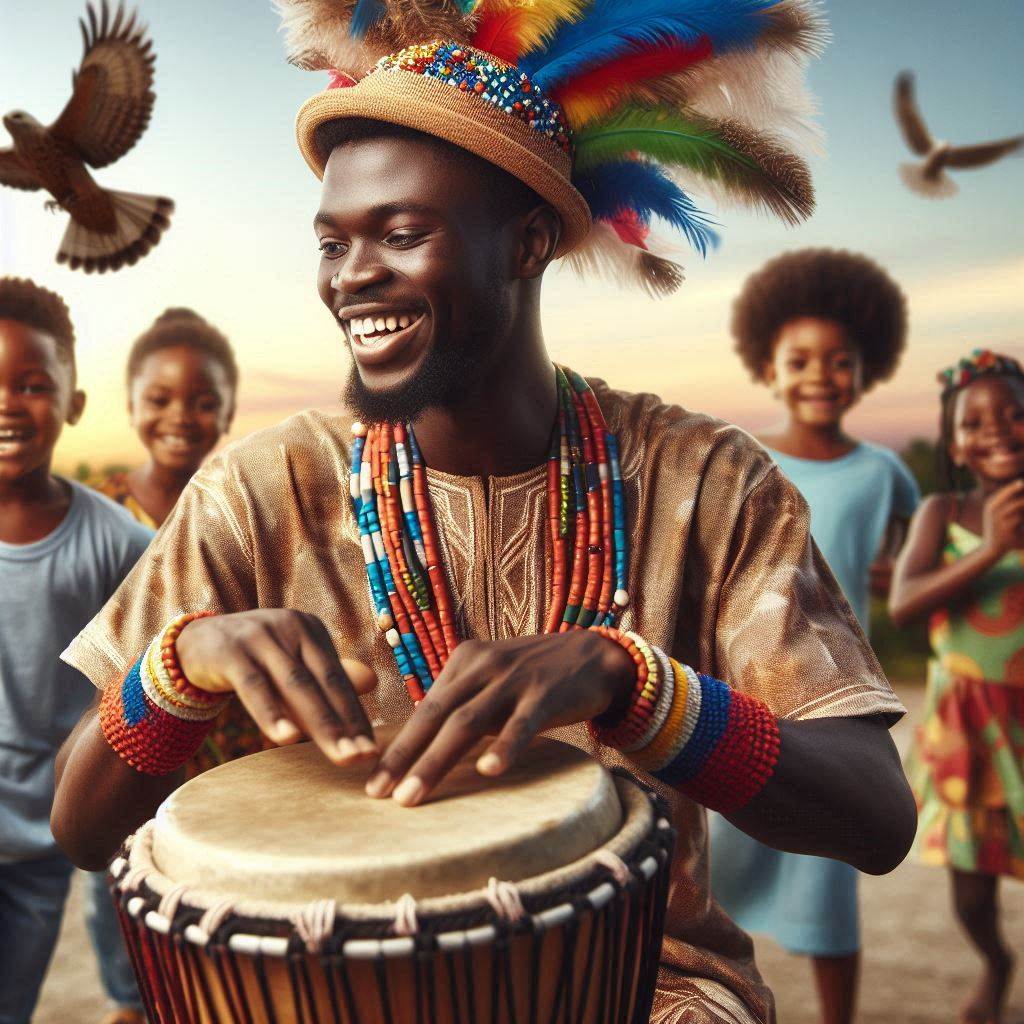
Evolution of Nigerian Musical Instruments
When we talk about the evolution of Nigerian musical instruments, we are delving into a rich history that spans centuries.
Traditional instruments have played a vital role in Nigerian culture and music, evolving over time to reflect changes in society.
Evolution of Traditional Instruments
- Ancient Nigerian tribes used instruments like drums, flutes, and stringed instruments made from materials like wood, animal hides, and gourds.
- These instruments were not only used for entertainment but also had cultural and spiritual significance, being used in ceremonies and rituals.
- As Nigerian society evolved, so did its musical instruments, with new instruments being developed and existing ones being modified.
- Instruments like the talking drum, kalangu, and shekere have been passed down through generations, maintaining their traditional roots.
Introduction of Modern Instruments
- With the introduction of modern technology, Nigerian musicians began incorporating instruments like guitars, keyboards, and synthesizers into their music.
- These instruments brought a new dimension to Nigerian music, allowing for greater versatility and creativity in sound production.
- Modern instruments added depth to traditional Nigerian music, helping to bridge the gap between old and new musical styles.
- Artists like King Sunny Ade and Fela Kuti were pioneers in using modern instruments to create a fusion of traditional Nigerian music with Western influences.
Fusion of Traditional and Modern Instruments
- In contemporary Nigerian music, we see a fusion of traditional and modern instruments, creating a unique sound that blends the old with the new.
- Artists like Burna Boy and Tiwa Savage are known for incorporating traditional Nigerian instruments like the talking drum into their music.
- This fusion of instruments not only pays homage to Nigeria’s musical roots but also helps to create a distinct sound that is recognizable on the global stage.
- Overall, the evolution of Nigerian musical instruments showcases the rich history and cultural significance of music in Nigeria, highlighting the country’s diverse musical landscape.
As we look to the future, it is clear that Nigerian music will continue to evolve, with traditional and modern instruments playing integral roles in shaping the sound of Nigerian music for generations to come.
Read: Scholarships for Christian Religious Studies Students
Regional Variations in Nigerian Musical Instruments
Differences in musical instruments used in various regions of Nigeria
When it comes to Nigerian musical instruments, each region has its distinct set of instruments that contribute to the rich cultural heritage of the country.
From the northern to the southern parts of Nigeria, different ethnic groups have developed unique instruments that play a vital role in their traditional music.
Northern Nigeria
- The northern region of Nigeria is known for its use of instruments such as the talking drum, goge, and kalangu.
- The talking drum, also known as “dundun” in Yoruba, is a drum with an hourglass shape that can mimic the tones of speech.
- The goge is a one-stringed fiddle that is used by the Hausa people in their music and dance performances.
- The kalangu is a traditional percussion instrument made from a dried gourd with beads or seeds attached to its surface.
Eastern Nigeria
- Eastern Nigeria is home to unique instruments like the ogene, udu, and ikoro.
- The ogene is a type of metal gong that is commonly used in Igbo traditional music for its deep and resonant sound.
- The udu is a clay pot drum that produces diverse tones depending on the way it is played.
- The ikoro is a large slit drum made from a hollowed-out tree trunk, used by the Igbo people for communication and musical performances.
Western Nigeria
- In the western region of Nigeria, instruments like the talking drum, sekere, and agidigbo are commonly used.
- The sekere is a type of gourd rattle covered with beads or seeds that produce rhythmic sounds when shaken.
- The agidigbo is a large wooden xylophone with gourd resonators that is played by the Yoruba people.
- These instruments contribute to the vibrant music scene in western Nigeria and are integral to the cultural identity of the region.
Exploration of how regional diversity influences Nigerian music
The regional variations in Nigerian musical instruments highlight the diversity and richness of the country’s musical heritage.
Each region’s unique instruments have shaped the sound and style of Nigerian music, contributing to its vibrant and dynamic nature.
The use of these instruments reflects the cultural traditions and practices of different ethnic groups, showcasing the creativity and innovation of Nigerian musicians.
By embracing and celebrating the regional diversity in musical instruments, Nigeria continues to preserve its cultural heritage and promote a sense of unity and identity among its people.
In a nutshell, the regional variations in Nigerian musical instruments play a crucial role in shaping the country’s diverse musical landscape.
The distinct sounds and styles of instruments from different regions contribute to the vibrancy and richness of Nigerian music, reflecting the cultural heritage and traditions of the various ethnic groups that make up the country.
With a wide range of instruments used across Nigeria, each region adds its unique flavor to the music scene, creating a dynamic and eclectic musical tapestry that showcases the talent and creativity of Nigerian musicians.
Read: The Future of Psychology Education in Nigeria
Preservation of Nigerian Musical Instruments
Preserving Nigerian musical instruments is essential for safeguarding the country’s rich cultural heritage. Various efforts are being made to ensure these traditional instruments are not lost to time.
Transform Your Career with Expert Guidance
Get personalized mentorship consulting that’s tailored to your unique path. Our expert advice is actionable and exclusive.
Get StartedEfforts to Preserve and Promote Traditional Nigerian Instruments
Numerous initiatives aim to preserve and promote traditional Nigerian instruments. Government bodies and cultural organizations run awareness campaigns highlighting the importance of these instruments.
These campaigns educate the public about the cultural significance of musical instruments like the talking drum, the udu, and the shekere.
Workshops and festivals are organized to celebrate Nigerian music. These events provide platforms for traditional musicians to showcase their skills.
Engaging the younger generation ensures the continuity of these traditions in events.
Moreover, schools introduce educational programs teaching students about Nigerian music.
These programs include lessons on playing traditional instruments, fostering appreciation among the youth.
Role of Cultural Institutions, Museums, and Musicians in Safeguarding Musical Heritage
Cultural institutions play a pivotal role in preserving Nigerian musical instruments. Museums across Nigeria have dedicated sections for traditional instruments, showcasing their history and significance.
These exhibitions help in educating visitors about the cultural context and usage of these instruments.
Institutions also conduct research to document the history and evolution of Nigerian musical instruments. This research is crucial for preserving knowledge that might otherwise be lost.
Cultural institutions ensure accurate passing down of craftsmanship knowledge by recording instrument-making processes.
Musicians themselves are vital in preserving these instruments. By incorporating traditional instruments into modern music, they keep these sounds alive and relevant.
Many musicians ensure younger generations learn to play instruments, preserving skills for the future.
Importance of Passing Down Knowledge of Instruments to Future Generations
Passing down knowledge of traditional Nigerian instruments to future generations is crucial. It ensures that these instruments continue to be a part of Nigerian culture.
Elders and musicians must share their expertise with younger individuals. This transmission of knowledge helps maintain the authenticity of musical traditions.
Incorporating traditional music education in school curricula is another effective method.
When children learn about these instruments from a young age, they develop a deep appreciation and respect for their cultural heritage.
This early exposure ensures that traditional music remains an integral part of Nigerian identity.
Community programs also play a significant role. They provide opportunities for intergenerational learning where elders teach the youth about traditional music.
These programs foster a sense of pride and ownership in cultural heritage among young Nigerians.
In review, preserving Nigerian musical instruments requires a concerted effort from various sectors.
Cultural institutions, museums, musicians, and educational programs all contribute to safeguarding this rich musical heritage.
By passing down knowledge to future generations, Nigeria ensures that its traditional instruments continue to thrive and resonate with the rhythms of its past.
Conclusion
Recap of the Significance of Nigerian Musical Instruments
Nigerian musical instruments hold immense cultural and historical significance. They are not merely tools for creating music. These instruments are vessels of tradition, storytelling, and community bonding.
The talking drum, with its unique ability to mimic human speech, exemplifies the intricate artistry embedded in Nigerian music.
The shekere, with its vibrant rhythms, highlights the joyous and communal aspects of musical gatherings.
These instruments connect the present with the past, preserving the rich heritage of Nigeria for future generations.
Nigerian musical instruments have played vital roles in ceremonies, festivals, and everyday life.
From the royal courts of ancient kingdoms to modern-day performances, they have maintained their relevance and charm. Each instrument, whether the udu or the ogene, carries with it a story of cultural pride and resilience.
Their diverse sounds and uses reflect the vast ethnic diversity within Nigeria, showcasing the country’s rich cultural tapestry.
Understanding and appreciating these instruments enriches our knowledge of Nigerian history and its vibrant musical traditions.
Call to Appreciate and Celebrate the Rich Musical Heritage of Nigeria
It is crucial to appreciate and celebrate the rich musical heritage of Nigeria. By recognizing the value of these traditional instruments, we honor the ingenuity and creativity of Nigerian artisans and musicians.
Celebrations and acknowledgments of this heritage can take many forms. Attend festivals, support local musicians, or simply learn about the history and sounds of these instruments.
The more we engage with Nigerian musical traditions, the more we contribute to their preservation and promotion.
The global influence of Nigerian music continues to grow, with traditional sounds blending seamlessly into contemporary genres.
Celebrating Nigerian musical instruments means celebrating the country’s influence on global music. By promoting and respecting these traditions, we ensure that the next generation understands and values this cultural wealth.
Nigerian musical instruments are not just relics of the past; they are vibrant elements of the present and future music scenes. Their sounds resonate with cultural significance and artistic excellence.
Encouragement to Explore and Support Nigerian Musicians
We must encourage exploration and support for Nigerian musicians who use traditional instruments in their music. These artists play a crucial role in keeping Nigeria’s musical heritage alive and relevant.
By incorporating traditional sounds into their compositions, they create a bridge between old and new, fostering a deeper appreciation for Nigeria’s cultural history.
There are many ways to support these musicians. Attend their concerts, purchase their music, and share their work with others. Use social media to highlight their contributions and promote their performances.
By doing so, we help sustain a vibrant musical tradition that continues to inspire and entertain.
Exploring the work of these musicians can be a rewarding journey. It offers a unique insight into the fusion of traditional and modern sounds, showcasing the versatility and richness of Nigerian music.
Let’s celebrate and support the artists who honor their heritage while pushing creative boundaries.
In closing, Nigerian musical instruments are treasures of cultural significance. Let’s appreciate, celebrate, and support the rich musical heritage they represent.
By doing so, we contribute to the preservation and evolution of Nigeria’s vibrant musical legacy.

